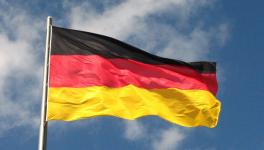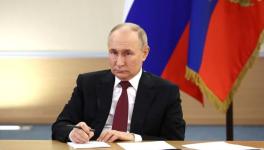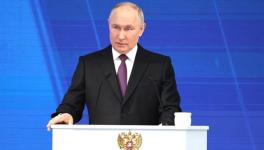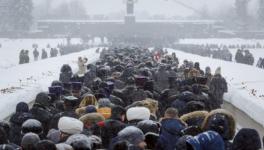The Rise and Rise of Far-Right in Germany
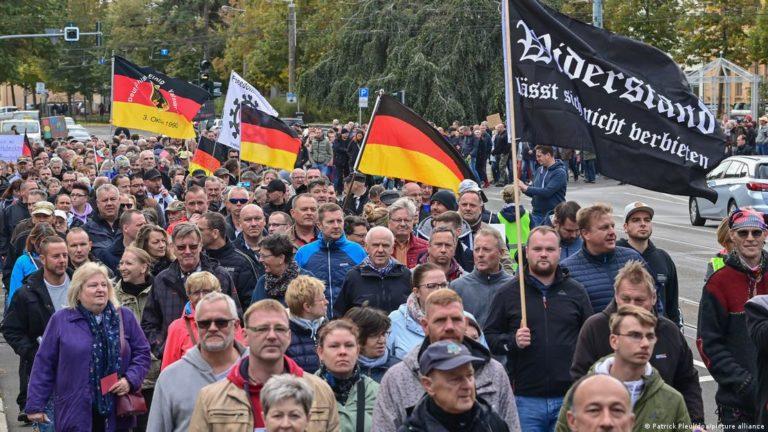
Germany’s far-right protesters fly national flag at demonstration
The political class in Germany is stunned by the findings of a YouGov poll published on Friday that 20% of German voters would give their vote to the Far-Right AfD (Alternative for Germany), making it the second-strongest party behind the Centre-Right CDU (28%) and ahead of Chancellor Olaf Scholz’s SPD (19%). There is no mistaking that it is a political earthquake.
Given Germany’s proportional representative system — which is unlike the US or the UK where, too, politics is fractious but is protected by the first-past-the-pole voting system — it is reasonable to estimate that the current “traffic-light” coalition between the Centre-Left SPD, the Greens (who polled 15%) and the neo-liberal Free Democrats or FDP (7%) no longer has a mandate to rule, after only one and a half years in office.
In the general election in 2021, the SPD had won 25.7%, the FDP 11.5%, and the Green Party 14.8% of the vote. This precipitous fall of the coalition in just 18 months introduces political uncertainties at a juncture when the economy is in deep recession, Ukraine war is at a tipping point and the rise of the Far-Right AfD, which by the way covers the entire far-right spectrum from democratic nationalists to Neo-Nazis, itself signifies a seminal shift in German politics since World War 2, with important consequences.
Twenty per cent is an important threshold already in a fragmented polity such as Germany’s and there are political observers who put the AfD’s outer potential at about 30%. So far, a coalition with the AfD has been a taboo for the two mainstream parties, CDU and SPD. In the developing situation, the CDU is facing a Hobson’s choice — a return to the “grand coalition” with SPD (for which there is no appetite, given the sordid record of the period from 2005-2009 and from 2013-2021 under Chancellor Angela Merkel.) The alternative will be a coalition with the Far Right AfD, which conceivably, may become inevitable at some point.
Actually, in European politics on the whole, that is the current trend — the Far-Right coming in from the cold. It happened in Sweden recently and is now happening in Finland. The point is, the AfD is on a roll now and once it breaks through the glass barrier of 20%, it will become progressively difficult for centrist parties to exclude it from mainstream politics as coalition partner.
The recession in Germany is expected to be long, which all but guarantees that in the short run at least, the economic cycle works to the advantage of the AfD. Immigration is another issue contributing to AfD’s support base. According to official figures, the number of asylum claims in Germany increased by 80% between January and March 2023 compared with the same period last year.
Two other issues agitating public opinion are disapproval of Scholz’s support for Ukraine and anger about his energy policies. Scholz and SPD have positioned themselves on Ukraine’s side. Now, this is a change in policy and the issue continues to divide people. The AfD, which is Eurosceptic and advocates improved relations with Russia, is capitalising on the fact that around one third of Germans do not agree with Scholz’s Ukraine / Russia policies.
Does this matter? It does. With the economy in recession — and, Germany dragging the entire Eurozone along with it — the surge of AfD is likely to dampen enthusiasm for pouring more money and material into Ukraine. For instance, only 28% of respondents in the latest survey support the delivery of German fighter jets to Ukraine.
According to a Deutsche Welle report, “Overall, support for weapons deliveries to Ukraine is declining, only a minority believes that the arms deliveries should be stepped up. The call for diplomacy is mounting: 55% now say the German government’s attempts at reaching negotiations to end the fighting should be intensified.”
Equally, there is a growing polarisation of views among Germans about their “European” identity. As a commentator pointed out, perhaps it’s a numerical coincidence only that the 18% who totally disagree with the notion of a European identity are the same number as the current polling figures for the AfD. More likely, it is an overlap.
Paradoxically, the numbers of europhobes and eurosceptics alike are rising, with the latter having a distinct edge at 56% over 41% europhobes! This can eventually put the EU in a trap, as low EU approval ratings make it harder for member states to agree to further integration and, yet, further integration is needed to make the EU more successful. The big picture is that the sort of EU integration through the backdoor that has been happening may not work anymore.
The AfD’s future potential is significant since in Germany’s proportional representation-based system, it doesn’t need to win outright majorities to govern. In the short term, though, there is a political gridlock looming ahead in Germany, compounded also by the fact that the Left is shrinking and might not even get the minimum 5% votes required to make it into the next parliament.
As for the Greens, they are stuck in the mud too, with their reputation tarnished out of a nepotism scandal, which will radiate for a long time (since the Greens are a closely-knit community and they will henceforth struggle to use the power of moral arguments, which has been a key element in their political rise.)
Besides, while in power, though the past year, the Greens pulled the plug on nuclear power, and drove Germany’s transition to renewable energy at breakneck speed, which is producing a backlash among voters. A law to force house owners to switch their heating systems from oil and gas to heat pumps, starting next January, has been a bloomer, since the costs to households are potentially crippling — varying between £15,000 – £40,000, depending on the size of the house. Poorer house owners are mostly lower middle class, and they also happen to be the part of the electorate that is most open to the Far Right.
Suffice to say, for a foreseeable future, the Greens are not going to be in a position to replace the traditional parties. Thus, a huge gap is opening in the ideological landscape at the political centre. To be sure, things are moving in such a direction that the AfD could become indispensable in the formation of a federal government in Berlin at some point.
Alas, all that talk about Germany being the next superpower alongside China has dissipated. It seems a distant dream now. Europe’s powerhouse is in shambles. The Ukraine crisis spoiled the party. But then, the German ruling elite must be largely blamed for it, having played a dubious role in Ukraine right since the regime change in 2014 — especially in the plot to subvert the Minsk accords envisaging regional autonomy for the Donbass within a federated Ukraine.
Fundamentally, the German elites have been unable or unwilling to figure out that their country’s economy and the nation’s prosperity has been built on the cheap limitless energy supplies from Russia and the potentials of the growing Russian market for Germany’s high-tech industry. The birds are coming home to roost.
MK Bhadrakumar is a former diplomat. He was India’s ambassador to Uzbekistan and Turkey. The views are personal.
Get the latest reports & analysis with people's perspective on Protests, movements & deep analytical videos, discussions of the current affairs in your Telegram app. Subscribe to NewsClick's Telegram channel & get Real-Time updates on stories, as they get published on our website.









